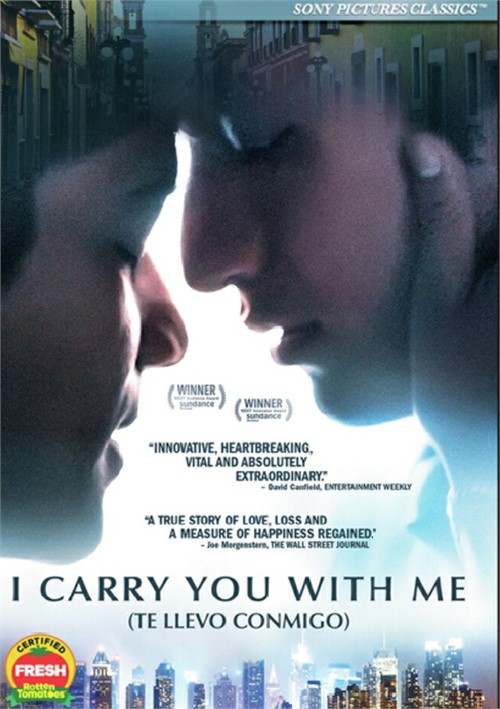(2021, 111 min)
Country: Mexico
Director: Heidi Ewing
Studio: Sony Pictures
Language: Spanish w/subtitles
SYNOPSIS: Academy-Award nominee Heidi Ewing (Jesus Camp, The Boys of Baraka) directs this luminous, moving narrative film debut. Based on a true story, "I Carry You with Me" follows a tender, decades-spanning romance between an aspiring chef and a teacher. Starting in provincial Mexico and continuing as first Ivan (Armando Espitia), then Gerardo (Christian Vasquez), journey towards sharing a life together in New York City, "I Carry You With Me" is an intimate love story, as well as a soulful rumination on family, sacrifice, regret, and ultimately, hope. Don't miss this remarkable, award-winning gay romance.
REVIEW:
"I Carry You With Me" is an epic love story that spans decades and was sparked by a chance encounter between two men in provincial Mexico. Based on a true story, ambition and societal pressure propel an aspiring chef to leave his soulmate and make the treacherous journey to New York, where life will never be the same.
We follow two young men from Mexico as they fall in love, cross the border and struggle to have a piece of the American Dream for themselves. Years later, one of them regrets leaving his son behind and the other wants to stay firmly in the U.S. where they have built their home. Both of them face the same hard consequence: because they came to the U.S. without documentation, they risk deportation and semi-permanent exile from Mexico.
Director Heidi Ewing weaves in the real-life inspirations of the younger characters, who recreate the men's lives before the story begins, right down to their d childhoods where their fathers tried to scare them into being straight young men. The movie quietly observes the couple work through these unspoken tensions.
We see and feel Ewing's love for her characters in beautifully natural ways. It is as if it we are another person standing next to the characters and sharing their feelings about the journey north and weary of the hard road ahead. We root for their successes and feel their pain when it comes and we develop a strong emotional connection to their journey.
The film reveals the intersection of misogyny and homophobia that exists among traditionalists. I see the film as proving that nothing beats reality for tales of love, perseverance, and the pursuit of happiness. Iván We meet Ivan (Armando Espitia) as a wide-eyed culinary school graduate who struggles to be seen in Puebla, Mexico and follow him to his eventual accomplishment as a chef and restaurateur in New York City. All the while, he balances a relationship with Gerardo (Christian Vázquez), a university teaching assistant he'd met at a gay bar in Puebla.
What follows is a story complete with dangerous border crossings, violent run-ins with homophobic society, and the ever-present fear of living in America as an undocumented immigrant. It's impossible not to hope for the two men since their desires are universal: safety, acceptance, economic mobility, and the right to love whoever you want.
The film touches on many themes that could each constitute their own film: working life in Puebla; coming of age as a gay man in 1980s Mexico; immigrating to the United States; opening a restaurant in New York City; reuniting with a long-distance boyfriend; being estranged from a son for 25 years; etc. and the film struggles under its ambition but is an intrinsically moving tale and it works.
It does, at times, feel unwieldy because of multiple themes across four decades and different geographies-from Puebla to Texas to New York City, and then back to Mexico again yet it perfectly showcases the legal and emotional messiness of migration.
Even though Iván and Gerardo are undocumented immigrants, they're human (and sweetly in love). They want to secure a safer future for themselves, and in the case of Iván, he's eager to put his culinary degree to use instead of being a dishwasher for the rest of his life.
During this transnational story, the diversity within Mexico also comes to the fore. Iván and Gerardo aren't rootless Mexicans-they're from urban Puebla, which looks starkly different from the deserts just south of the Texas border where Iván makes his fraught crossing. Meanwhile, the southernmost state of Chiapas contains the farm Gerardo grew up on and behind the scenes, Iván's actor Armando Espitia hails from nearby Mexico City while Gerardo's actor, Christian Vázquez, was born in Guadalajara.
In fact, I read that "except for Ewing and a handful of other crew, the entire main cast and production crew was Mexican." The film centers an LGBTQ story, and while a cisgender gay romance between two men confronted with 20th century homophobia does feel like covered territory, "I Carry You With Me" brings with it all the specificity mentioned above plus the added gravitas of being based on real people.
Ewing also reveals the intersection of misogyny and homophobia that exists among traditionalists in Mexico, as seen through the fathers of both Iván and Gerardo. During flashbacks to childhood, we see how the men punish their sons for exhibiting any behavior not firmly in line with conservative notions of masculinity. Even as young adults, when Iván meets Gerardo's family as "a friend", he's derided by Gerardo's dad who says that washing dishes is women's work.
The film avoids the pitfalls of so many earlier queer films that end in violence and tragedy. It's wonderful to flash forward to documentary-style photographs as the credits roll, and to see photos of the actual Iván and Gerardo smiling for the camera.
This is Ewing's first narrative and it impressively has a sense of both timeliness and timelessness.
-- Review by Amos Lassen, Reviews(http://wwww.reviewsbyamoslassen.com)




